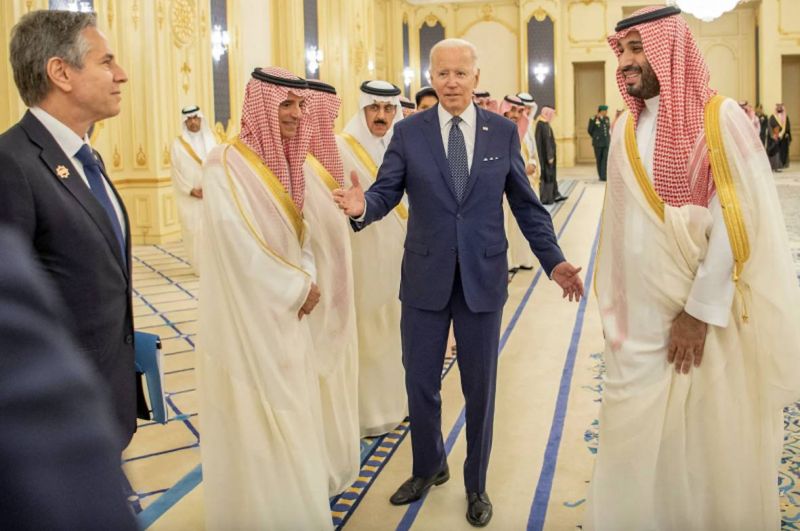
US President Joe Biden received by Saudi Crown Prince Mohammad bin Salman during his visit to Jeddah, July 15, 2022. (Credit: Bandar al-Jaloud/AFP)
The UN revealed in 2022 that Saudi border guards abused Ethiopian migrants — which caused a stir when a Human Rights Watch (HRW) report was published last week. The United States was aware of this at the time, but did not make waves.
The United Nations High Commissioner for Human Rights sent a letter to the Saudi authorities on Oct. 3, 2022, reporting allegations that hundreds of migrants trying to cross the border from Yemen had been killed or injured.
According to the US State Department, the New York Times reported, this letter was made public 60 days later, allowing the Democratic administration to learn about specific accusations.
Double standards
Since then, condemnations of Saudi conduct have been few and subtle. In January, Richard Mills, the deputy US representative to the United Nations, said during a Yemen briefing, “we remain concerned by alleged abuses against migrants on the border with Saudi Arabia,” adding that the issue was briefly mentioned in the State Department’s annual report on human right practices in Saudi Arabia, published in March.
Following the release of the HRW report, Washington said it had raised the issue with the Saudi authorities and called for a thorough and transparent investigation.
This contrasts with reactions that followed the murder of Saudi journalist Jamal Khashoggi in his country’s consulate in Istanbul in October 2018. This episode — the CIA blamed Crown Prince Mohammed bin Salman, aka MBS, for the journalist’s killing — caused an international outcry, leading to the isolation of the kingdom’s de facto ruler.
Current circumstances are very different. After the Russian invasion of Ukraine and the ensuing surge in oil prices, Riyadh has regained its place in the concert of nations and MBS has been rehabilitated.
During a regional tour in July 2022, US President Joe Biden traveled to Jeddah to meet the Saudi crown prince — Biden had promised to treat MBS as a pariah — in the hope of convincing him to increase OPEC+ oil output in the midst of inflation. His gesture was in vain.
According to several media reports, the two leaders could meet again on the sidelines of the G20 summit in India in September, although Saudi Arabia’s decision to cut production has not caused uncontrollable price hikes.
Another matter important to Biden is the region’s security architecture, which mainly consists of consolidating the anti-Iranian front with his ally, Israel — particularly as Tehran expanded its nuclear activities after Donald Trump’s unilateral withdrawal from the Vienna agreement in 2018. Iran increased its stockpile of 60 percent enriched uranium, thus approaching the threshold for nuclear arms production.
Faced with the failure of negotiations to restore the 2015 deal, Washington began bilateral talks that led to a recent prisoner swap deal, which has helped to slow down Iran’s nuclear program, according to the Wall Street Journal.
Normalization with Israel
At the same time, the White House stepped up its diplomatic efforts to bring about normalization between Israel and Saudi Arabia, which would provide a strong symbolic endorsement for the recognition of the Jewish state.
With a view to concluding an agreement before spring 2024, when Joe Biden will be concentrating on his presidential re-election campaign, the White House is trying to obtain major concessions on the Palestinian issue, Axios media revealed on Friday. This while respecting the kingdom’s official ambition to be the defender of this cause among its own people and Arab countries. This is a difficult task with Benjamin Netanyahu’s current government, the most far right-wing in Israel’s history, which includes ultra-Orthodox and Jewish supremacists.
According to sources mentioned by Axios, Ron Dermer, Israel's minister for strategic affairs, who is in charge of normalization with Arab countries, showed no sign of opening up during his recent visit to Washington, saying that Israel would nevertheless be prepared to make concessions on the Saudi nuclear program.
Riyadh has set a number of conditions for normalization: it demanded that Washington facilitate arms sales to the kingdom, conclude a security deal and, above all, provide assistance to its nuclear program.
Despite the risk of seeing the region plunged into an uranium enrichment and nuclear arms race — notwithstanding Saudi claims that their aim is purely civilian — the US seems to consider such assistance a possibility. This flexibility may have something to do with Saudi Arabia reportedly considering a Chinese proposal to build a nuclear power station in the kingdom, according to Saudi officials quoted by the Wall Street Journal on Friday.
This would be a more affordable option, and would not be conditional on Riyadh complying with Washington’s non-proliferation requirements to not enrich uranium or or exploit its uranium mines.
Although the offer is on the table, Saudi officials interviewed by the American daily admitted that it was aimed more at obtaining American flexibility on these issues, security and technological cooperation with Beijing being a red line for Washington.
This story originally ran in French in L’Orient-Le Jour